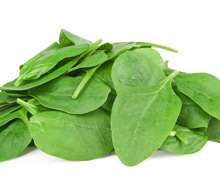
There is currently no known treatment for liver steatosis, or fatty liver disease, but new research shows a compound found in many types of vegetables may reduce the accumulation of fat in the liver. Inorganic nitrate found in green leafy vegetables like spinach was shown to be effective in keeping mice from a buildup of fat in the liver.
Liver steatosis is a common condition that affects nearly 25 percent of the population. The most common cause is being overweight followed by alcohol consumption. It can lead to life-threatening diseases like cirrhosis and liver cancer.
Researchers at Karolinska Institutet in Sweden were looking for prevention methods for cardiovascular diseases and type 2 diabetes when they came across these findings. "When we supplemented with dietary nitrate to mice fed with a high-fat and sugar Western diet, we noticed a significantly lower proportion of fat in the liver," says scientist Mattias Carlström.
The results were also confirmed by cell culture studies using human liver cells. Additionally, researchers observed the reduction of blood pressure and improved glucose levels in mice with type 2 diabetes.
"We think that these diseases are connected by similar mechanisms, where oxidative stress causes compromised nitric oxide signalling, which has a detrimental impact on cardiometabolic functions," Carlström says. "We now demonstrate an alternative way to produce nitric oxide, where more nitrate in our diet can be converted to nitric oxide and other bioactive nitrogen species in our body."
While there is still uncertainty in the scientific community about which properties in vegetables make them healthy, Carlström believes he has found the answer.
"No one has yet focused on nitrate, which we think is the key," Carlström said. "We now want to conduct clinical studies to investigate the therapeutic value of nitrate supplementation to reduce the risk of liver steatosis. The results could lead to the development of new pharmacological and nutritional approaches.
"And it doesn't take huge amounts to obtain the protective effects we have observed—only about 200 grams per day," Carlström says. "Unfortunately, however, many people choose not to eat enough vegetables these days."
Click here to read more in the Proceedings of the National Academy of Sciences.
